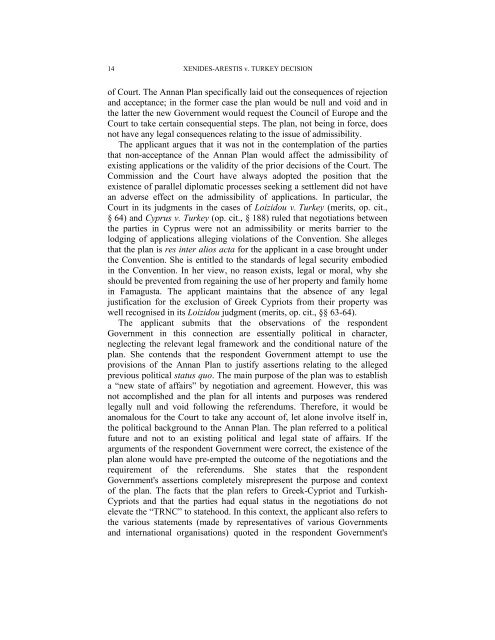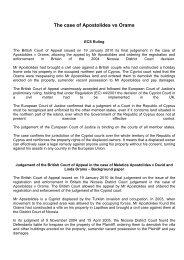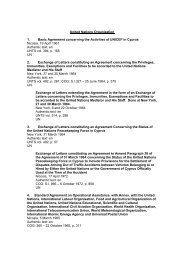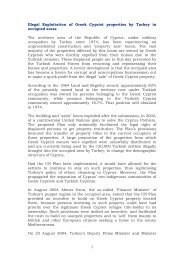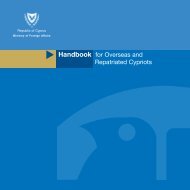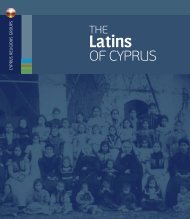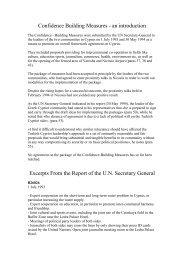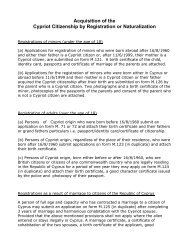Myra Xenides- Arestis v. Turkey
Myra Xenides- Arestis v. Turkey
Myra Xenides- Arestis v. Turkey
You also want an ePaper? Increase the reach of your titles
YUMPU automatically turns print PDFs into web optimized ePapers that Google loves.
14 XENIDES-ARESTIS v. TURKEY DECISIONof Court. The Annan Plan specifically laid out the consequences of rejectionand acceptance; in the former case the plan would be null and void and inthe latter the new Government would request the Council of Europe and theCourt to take certain consequential steps. The plan, not being in force, doesnot have any legal consequences relating to the issue of admissibility.The applicant argues that it was not in the contemplation of the partiesthat non-acceptance of the Annan Plan would affect the admissibility ofexisting applications or the validity of the prior decisions of the Court. TheCommission and the Court have always adopted the position that theexistence of parallel diplomatic processes seeking a settlement did not havean adverse effect on the admissibility of applications. In particular, theCourt in its judgments in the cases of Loizidou v. <strong>Turkey</strong> (merits, op. cit.,§ 64) and Cyprus v. <strong>Turkey</strong> (op. cit., § 188) ruled that negotiations betweenthe parties in Cyprus were not an admissibility or merits barrier to thelodging of applications alleging violations of the Convention. She allegesthat the plan is res inter alios acta for the applicant in a case brought underthe Convention. She is entitled to the standards of legal security embodiedin the Convention. In her view, no reason exists, legal or moral, why sheshould be prevented from regaining the use of her property and family homein Famagusta. The applicant maintains that the absence of any legaljustification for the exclusion of Greek Cypriots from their property waswell recognised in its Loizidou judgment (merits, op. cit., §§ 63-64).The applicant submits that the observations of the respondentGovernment in this connection are essentially political in character,neglecting the relevant legal framework and the conditional nature of theplan. She contends that the respondent Government attempt to use theprovisions of the Annan Plan to justify assertions relating to the allegedprevious political status quo. The main purpose of the plan was to establisha “new state of affairs” by negotiation and agreement. However, this wasnot accomplished and the plan for all intents and purposes was renderedlegally null and void following the referendums. Therefore, it would beanomalous for the Court to take any account of, let alone involve itself in,the political background to the Annan Plan. The plan referred to a politicalfuture and not to an existing political and legal state of affairs. If thearguments of the respondent Government were correct, the existence of theplan alone would have pre-empted the outcome of the negotiations and therequirement of the referendums. She states that the respondentGovernment's assertions completely misrepresent the purpose and contextof the plan. The facts that the plan refers to Greek-Cypriot and Turkish-Cypriots and that the parties had equal status in the negotiations do notelevate the “TRNC” to statehood. In this context, the applicant also refers tothe various statements (made by representatives of various Governmentsand international organisations) quoted in the respondent Government's


